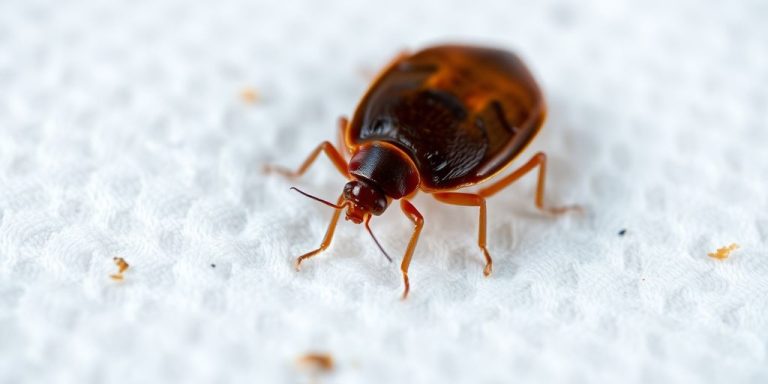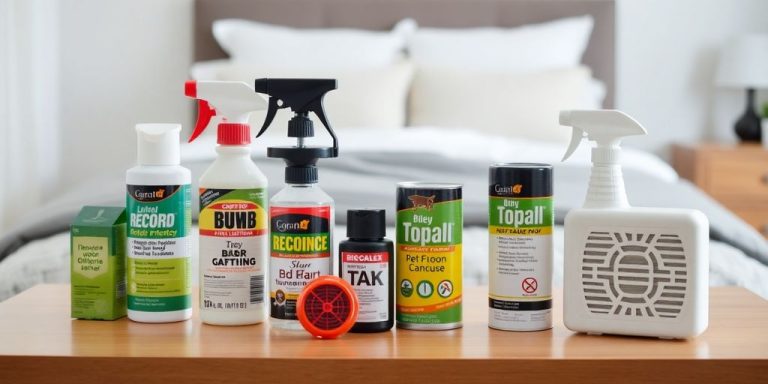Termites can be a serious problem for homeowners, causing significant damage to structures if left unchecked. Understanding how termites behave and what to look for can help you take action before it’s too late. This guide will provide you with essential information on termite control services available in your area, ensuring you can protect your home effectively.
Key Takeaways
- Identify common types of termites and their signs to catch infestations early.
- Ask the right questions when hiring a termite exterminator to ensure quality service.
- Explore both chemical and non-chemical treatment options for effective termite control.
- Regular home maintenance and inspections can prevent termite infestations.
- Understand the costs involved in termite control to budget effectively.
Understanding Termite Behavior and Risks

Termites are small insects that can cause significant damage to homes and buildings. Understanding their behavior is crucial for effective control. Here are some key points:
Common Types of Termites
- Subterranean Termites: These live underground and are the most destructive.
- Drywood Termites: They infest dry wood and do not require contact with the soil.
- Dampwood Termites: They prefer moist wood and are often found in decaying trees.
Signs of Termite Infestation
Look for these signs to identify a potential infestation:
- Mud tubes on walls or foundations.
- Hollow-sounding wood when tapped.
- Discarded wings near windows or doors.
Potential Damage Caused by Termites
Termites can cause extensive damage, including:
- Structural weakening of beams and supports.
- Damage to furniture and wooden fixtures.
- Increased repair costs if not addressed promptly.
Regular inspections can help catch termite problems early, preventing costly repairs.
By being aware of termite behavior and risks, homeowners can take proactive steps to protect their properties from these destructive pests. Prevention is key to avoiding infestations and the associated costs.
Choosing the Right Termite Control Services

When it comes to dealing with termites, selecting the right control service is crucial. You want a service that is reliable and effective. Here are some important factors to consider:
Factors to Consider When Selecting a Service
- Experience: Look for companies with a proven track record in termite control.
- Methods Used: Ensure they use safe and effective treatment methods.
- Customer Reviews: Check online reviews to gauge customer satisfaction.
Questions to Ask Your Exterminator
- What types of treatments do you offer?
- How long will the treatment take?
- Do you provide a warranty for your services?
Comparing Local Termite Control Companies
To help you make an informed choice, consider creating a comparison table:
| Company Name | Experience | Treatment Options | Customer Rating |
|---|---|---|---|
| Flatline Pest Control | 30 years | Chemical & Non-Chemical | 4.8/5 |
| Local Exterminator A | 15 years | Chemical Only | 4.5/5 |
| Local Exterminator B | 10 years | Non-Chemical Only | 4.2/5 |
Choosing the right termite control service can save you time and money in the long run. Make sure to do your research and ask the right questions to find the best fit for your needs.
Effective Termite Treatment Methods
Chemical Treatments and Their Benefits
Chemical treatments are one of the most common ways to deal with termites. These treatments can effectively eliminate termites and prevent future infestations. Using chemicals can provide quick results, but it’s important to choose the right type for your situation. Here are some common chemical treatments:
- Liquid termiticides: These create a barrier in the soil to keep termites away.
- Bait systems: These attract termites and then poison them.
- Fumigation: This method involves sealing the home and using gas to kill termites.
Non-Chemical Treatment Options
For those looking for alternatives, there are non-chemical methods available. These can be safer for the environment and your family. Some options include:
- Heat treatment: Raising the temperature in your home to kill termites.
- Borate treatments: Applying borate to wood to prevent termite damage.
- Nematodes: Using beneficial nematodes that attack termites.
Integrated Pest Management for Termites
Integrated Pest Management (IPM) combines different strategies to control termites effectively. This approach focuses on long-term prevention and includes:
- Regular inspections to catch infestations early.
- Combining chemical and non-chemical methods for a balanced approach.
- Educating homeowners about termite risks and prevention.
By understanding and applying these treatment methods, homeowners can effectively manage termite issues and protect their properties from damage.
In summary, whether you choose chemical treatments, non-chemical options, or an integrated approach, it’s crucial to act quickly to prevent further damage from termites. Effective termite control is essential for maintaining a safe and healthy home.
Preventative Measures to Avoid Termite Infestations
Home Maintenance Tips to Prevent Termites
To keep termites away, regular home maintenance is key. Here are some effective tips:
- Keep your home clean: Regularly vacuum and sanitize areas, especially the kitchen. Store food in airtight containers and dispose of garbage frequently.
- Seal cracks and holes: Inspect your home for any gaps in walls, floors, or foundations. Sealing these can prevent termites from entering.
- Remove standing water: Eliminate any sources of standing water around your home, as this can attract termites.
Landscaping Practices to Deter Termites
Your yard can also play a role in termite prevention. Consider these practices:
- Trim shrubs and trees: Keep branches and shrubs well-trimmed and away from your home to reduce access points.
- Store firewood properly: If you use firewood, keep it at least 20 feet away from your home and off the ground.
- Clear debris: Regularly remove fallen leaves and other debris from your yard to minimize hiding spots for termites.
Regular Inspections and Monitoring
Conducting regular inspections can help catch termite issues early. Here’s what to do:
- Schedule inspections at least once a year with a professional.
- Look for signs of termite activity, such as mud tubes or damaged wood.
- Stay informed: Keep an eye on any changes in your home that could indicate a problem.
By taking these preventative measures, you can significantly reduce the risk of termite infestations in your home. Remember, early detection is crucial to protecting your property from costly damage.
Cost Considerations for Termite Control
Understanding Pricing Models
When it comes to termite control, costs can vary widely. Here are some key points to consider:
- Average costs for termite treatment can range from $230 to $2,500 or more, depending on the severity of the infestation.
- Factors like the size of your home and the extent of the damage will influence the final price.
- Some companies may offer a flat rate, while others charge based on the number of visits needed.
Budgeting for Termite Control Services
To effectively budget for termite control, consider the following:
- Initial Inspection: Many companies offer free inspections, but some may charge a fee.
- Treatment Options: Chemical treatments tend to be more expensive than non-chemical methods.
- Follow-Up Services: Regular monitoring and follow-up treatments can add to your overall costs.
Cost-Effective Solutions for Homeowners
Homeowners can take several steps to manage costs:
- Preventative Measures: Regular maintenance can help avoid costly infestations.
- DIY Options: For minor issues, consider DIY methods, but be cautious with severe infestations.
- Compare Quotes: Always get multiple quotes from local exterminators to find the best deal.
Remember, investing in professional termite control can save you from more expensive repairs down the line.
| Treatment Type | Average Cost Range |
|---|---|
| Chemical Treatments | $230 – $2,500+ |
| Non-Chemical Treatments | $100 – $1,500 |
| Follow-Up Inspections | $75 – $300 |
By understanding these cost considerations, you can make informed decisions about termite control services and protect your home effectively.
The Importance of Professional Termite Inspections

What to Expect During an Inspection
When you schedule a professional termite inspection, you can expect a thorough examination of your home. The inspector will look for signs of infestation, such as mud tubes, damaged wood, and droppings. They will also check areas that are often overlooked, like basements and crawl spaces. A detailed report will be provided, outlining any findings and recommendations.
How Often Should Inspections Be Conducted
It’s recommended to have your home inspected for termites at least once a year. If you notice any signs of termite activity, you should schedule an inspection immediately. For homes without any signs of termites, inspections every two years are generally sufficient. Regular inspections help catch problems early, preventing costly damage.
Benefits of Regular Professional Inspections
Regular inspections offer several benefits:
- Early detection of termite activity, which can save you money in repairs.
- Peace of mind knowing your home is protected.
- Professional advice on how to maintain a termite-free environment.
Regular inspections are crucial for protecting your home from the hidden dangers of termites. They can cause significant damage that may not be visible until it’s too late.
Summary
In summary, professional termite inspections are essential for maintaining the integrity of your home. They help identify potential issues before they escalate, ensuring your property remains safe and sound. Don’t wait until you see signs of termites; schedule an inspection today!
Local Resources and Support for Termite Control

Finding Local Extermination Experts
When dealing with termites, it’s essential to find local extermination experts who understand the specific challenges in your area. Here are some ways to locate them:
- Online Directories: Websites like Angi and HomeAdvisor can help you find top-rated professionals.
- Community Recommendations: Ask neighbors or friends for referrals to trusted exterminators.
- Local Pest Control Companies: Search for companies that specialize in termite control in your region.
Community Programs and Initiatives
Many communities offer programs to help residents manage pest issues, including termites. These may include:
- Workshops: Educational sessions on pest prevention and control.
- Subsidized Inspections: Some local governments provide free or discounted inspections for homeowners.
- Awareness Campaigns: Initiatives to inform the public about termite risks and prevention strategies.
Online Resources and Guides
The internet is a valuable tool for learning about termite control. Here are some resources to consider:
- Pest Control Blogs: Many experts share tips and advice on their blogs.
- YouTube Tutorials: Video guides can provide visual instructions on identifying and treating infestations.
- Government Websites: Check local agricultural or environmental agencies for guidelines on pest management.
Remember, early detection is key! Regular inspections can help catch termite problems before they escalate into costly repairs.
By utilizing these local resources and support systems, you can effectively manage termite issues and protect your home from potential damage.
Highlighted Information
- Local Extermination Experts: Finding professionals who understand your area’s specific challenges is crucial.
- Community Programs: Many communities offer workshops and subsidized inspections to help residents.
- Online Resources: Blogs, videos, and government websites can provide valuable information on termite control.
Final Thoughts on Termite Control
Dealing with termites can be tough, but you don’t have to face it alone. Finding the right local extermination service is key to protecting your home. Remember to check reviews and get quotes from different companies to find the best fit for your needs. Taking action quickly can save you money and stress in the long run. So, if you suspect termites, don’t wait! Reach out to a professional today and keep your home safe.
Frequently Asked Questions
What are the main types of termites?
The most common types of termites include subterranean, drywood, and dampwood termites. Each type has its own habits and can cause different kinds of damage.
How can I tell if I have termites in my home?
Look for signs like mud tubes on walls, discarded wings, or hollow-sounding wood. You might also notice small piles of sawdust.
What kind of damage can termites cause?
Termites can cause serious damage to wooden structures in your home, including beams, floors, and furniture. This damage can be expensive to repair.
How do I choose a termite control service?
When picking a termite control service, consider their experience, customer reviews, and the types of treatments they offer.
What are some effective ways to prevent termite infestations?
To prevent termites, keep wood away from the ground, fix leaks, and have regular inspections of your home.
How much does termite control usually cost?
The cost of termite control can vary widely based on the treatment method and the size of the infestation. It’s best to get quotes from several companies.




